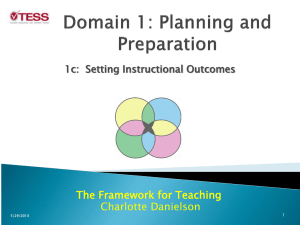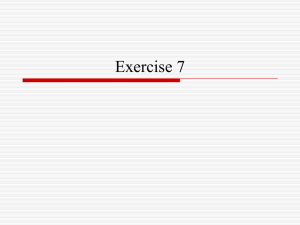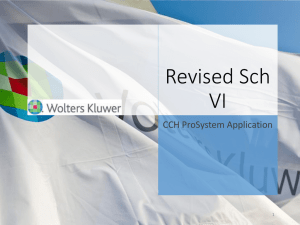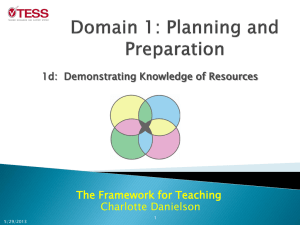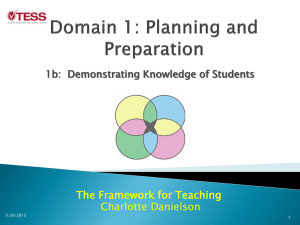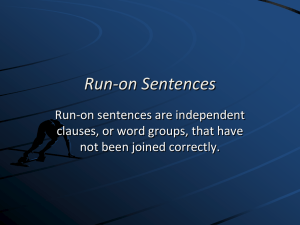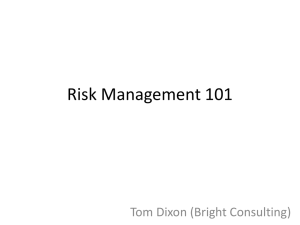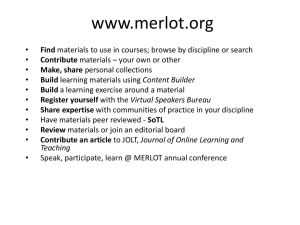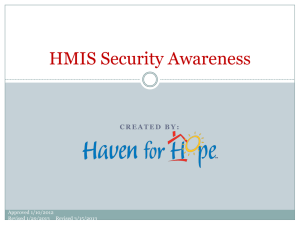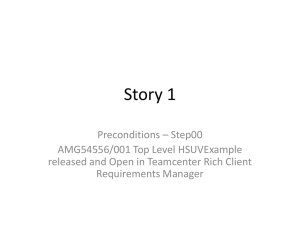PowerPoint
advertisement
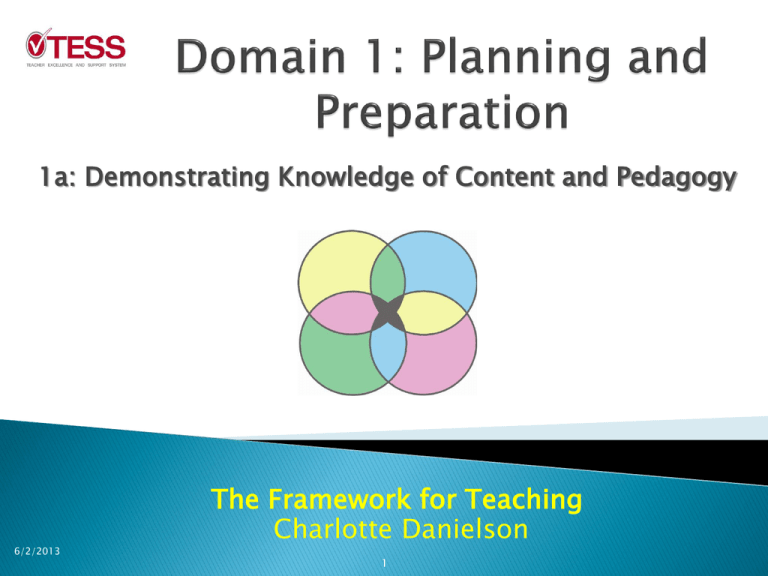
1a: Demonstrating Knowledge of Content and Pedagogy The Framework for Teaching Charlotte Danielson 6/2/2013 1 Understand the elements of 1a Distinguish the difference in levels of performance Review examples of 1a behavior Identify my level of performance on 1a Incorporate strategies to improve my level of performance in 1a 2 Revised 6/2/2013 Teachers must have command of the subjects they teach. Teachers must know which concepts and skills are central to a discipline and which are peripheral. Teachers must know how the discipline has evolved into the 21st century, incorporating issues such as global awareness and cultural diversity. 3 Revised 6/2/2013 Accomplished teachers understand internal relationships within the disciplines they teach, knowing prerequisite concepts and skills. Teachers are also aware of typical student misconceptions in the discipline, and they work to dispel them. Knowledge of content is not sufficient; in advancing student understanding, teachers must be familiar with particular pedagogical approaches best suited to each discipline. 4 Revised 6/2/2013 Knowledge of content and the structure of the discipline 1. Every discipline has a dominant structure, with smaller components or strands, as well as central concepts and skills. 5 Revised 6/2/2013 The Elements 2. Knowledge of prerequisite relationships Some disciplines—for example, mathematics—have important prerequisites; experienced teachers know what these are and how to use them in designing lessons and units. 6 Revised 6/2/2013 The Elements (cont’d) 3. Knowledge of content-related pedagogy Different disciplines have "signature pedagogies" that have evolved over time and been found to be most effective in teaching. 7 Revised 6/2/2013 On a Post-it, identify the specific pedagogies that work well in your classroom for your content area. Identify three pedagogies that you have heard about that you would like to know how to use. 8 Revised 6/2/2013 Lesson and unit plans that reflect important concepts in the discipline. Lesson and unit plans that accommodate prerequisite relationships among concepts and skills. Clear and accurate classroom explanations. 9 Revised 6/2/2013 Accurate answers to students' questions Feedback to students that furthers learning Interdisciplinary connections in plans and practice 10 Revised 6/2/2013 How might you provide evidence of your effectiveness in this component? What written materials could you provide? What could be observed in your classroom that connects to 1a? These items could be used as artifacts. 11 Revised 6/2/2013 The teacher's plan indicates that students need to know how to add and subtract fractions before doing this lesson. Relevant: This reflects the element knowledge of prerequisite relationships. During class time, three students ask the teacher to tell them where to go next after completing the first station. Not Relevant: This reflects 3a: Communicating with Students-directions for activities. 12 Revised 6/2/2013 The middle school science teacher has a degree in biology. Relevant: This reflects the element of knowledge of content and the structure of the discipline. Ms. P, the eighth-grade teacher, does not know whether students have learned the seventhgrade curriculum. Relevant: She does not know what she can build on if she does not know their prior knowledge. 13 Revised 6/2/2013 In science Ms. S’s class is studying the solar system. She made arrangements for them to visit the city’s planetarium to extend their understanding. Not Relevant: This reflects 1d Demonstrating Knowledge of Resources. 14 Revised 6/2/2013 You will read four classroom observation descriptions. After each of the four descriptions, jot down on a post-it what performance level you would assign it and why. After all four, compare with your table and discuss specific reasons why you rated it as you did. 15 Revised 6/2/2013 A. The teacher is familiar with the important concepts in the discipline, but displays a lack of awareness of how these concepts relate to one another. The teacher indicates some awareness of prerequisite learning, although such knowledge may be inaccurate or incomplete. The teacher’s plans and practice reflect a limited range of pedagogical approaches to the discipline or to the students. Teachers read scenarios at tables. 16 Revised 6/2/2013 B. In planning and practice, the teacher makes content errors or does not correct errors made by students. The teacher displays little understanding of prerequisite knowledge important to student learning of the content. The teacher displays little or no understanding of the range of pedagogical approaches suitable to student learning of the content. 17 Revised 6/2/2013 C. The teacher displays extensive knowledge of the important concepts in the discipline & how these relate both to one another and to other disciplines. The teacher demonstrates understanding of prerequisite relationships among topics & concepts and understands the connection to cognitive structures that ensure student understanding. The teacher's plans & practice reflect familiarity with a wide range of effective pedagogical approaches in the discipline and the ability to anticipate student misconceptions. 18 Revised 6/2/2013 D. The teacher displays solid knowledge of the important concepts in the discipline and how these relate to one another. The teacher demonstrates accurate understanding of prerequisite relationships among topics. The teacher's plans and practice reflect familiarity with a wide range of effective pedagogical approaches in the subject. 19 Revised 6/2/2013 A. Basic (Level 2) B. Unsatisfactory (Level 1) C. Distinguished (Level 4) D. Proficient (Level 3) Any surprises? 20 Revised 6/2/2013 The teacher can identify important concepts of the discipline and their relationships to one another. The teacher provides clear explanations of content. The teacher answers students' questions accurately and provides feedback that furthers their learning. Instructional strategies in unit and lesson plans are entirely suitable to the content. 21 Revised 6/2/2013 The teacher's understanding of the discipline is rudimentary. The teacher's knowledge of prerequisite relationships is inaccurate or incomplete. Lesson and unit plans use limited instructional strategies, and some are not suitable to the content. 22 Revised 6/2/2013 The teacher makes content errors. The teacher does not consider prerequisite relationships when planning. The teacher's plans use inappropriate strategies for the discipline. 23 Revised 6/2/2013 In addition to the characteristics of a level of performance 3, The teacher cites intra- and interdisciplinary content relationships. The teacher's plans demonstrate awareness of possible student misconceptions and how they can be addressed. The teacher's plans reflect recent developments in contentrelated pedagogy. 24 Revised 6/2/2013 In a unit on 19th-century literature, the teacher incorporates information about the history of the same period. Before beginning a unit on the solar system, the teacher surveys the students on their beliefs about why it is hotter in the summer than in the winter. 25 Revised 6/2/2013 The teacher's plan for area and perimeter invites students to determine the shape that will yield the largest area for a given perimeter. The teacher has realized her students are not sure how to use a compass, and so she plans to have them practice that skill before introducing the activity on angle measurement. The teacher plans to expand a unit on civics by having students simulate a court trial. 26 Revised 6/2/2013 The teacher plans lessons on area and perimeter independently of one another, without linking the concepts together. The teacher plans to forge ahead with a lesson on addition with regrouping, even though some students have not fully grasped place value. The teacher always plans the same routine to study spelling: pretest on Monday, copy the words five times each on Tuesday and Wednesday, test on Friday. 27 Revised 6/2/2013 The teacher says, "The official language of Brazil is Spanish, just like other South American countries.“ The teacher says, "I don't understand why the math book has decimals in the same unit as fractions.“ The teacher has his students copy dictionary definitions each week to help them learn to spell difficult words. 28 Revised 6/2/2013 Unsatisfactory Not No Not clear Unaware Does not respond Poor Not congruent Basic Some Attempts to Limited Moderate Uneven Inconsistent Rudimentary 29 Proficient Distinguished Consistent High quality Timely Accurate Appropriate Clear Effective High expectations All students Highly effective Entirely appropriate Adapted for individual students Fully aligned Extensive Revised 6/2/2013 Does your lesson plan. . . identify the state standard (or appropriate CCSS)? identify prerequisite student knowledge or skills needed for this work? identify your assessment strategy? clearly fit within the overall unit plan and learning goals for the year? 30 Revised 6/2/2013 Does your unit plan. . . focus on a key standard or set of standards for the grade level and subject area you teach? identify a series of lessons that build on each other? include both formative and summative assessments? 31 Revised 6/2/2013 Does your unit plan. . . focus on a key standard or set of standards for the grade level and subject you teach? identify a series of lessons that build on each other? include both formative and summative assessments? 32 Revised 6/2/2013 Does your unit plan. . . integrate identify other subjects? prerequisite skills? include a strategy for addressing common misconceptions and errors? 33 Revised 6/2/2013 When observing a lesson in your classroom, your principal or other evaluator/observer may look for the following: How clearly and accurately you explain concepts and procedures Whether or not you make any content or conceptual errors Evidence of students' understanding of concepts, procedures, and skills addressed in the lesson Evidence that student questions are being addressed appropriately How you respond to student errors 34 Revised 6/2/2013 Before being observed, you may be asked these questions in a planning conference: What are you planning to teach in your lesson? Why? What is the learning objective? Is this a key learning objective? How do you know? What prerequisite knowledge or skills do the students need for this lesson? How does this lesson fit within the overall unit plan as well as the goals for the year? How will you know if students understand the lesson? What common misconceptions do you expect to see? 35 Revised 6/2/2013 Our performance goal is to LIVE in 3… And vacation in 4. 36 Revised 6/2/2013 After reviewing the Performance Levels for Domain 1a: Demonstrating Knowledge of Content and Pedagogy, explain some methods you have used to improve your content knowledge? How will you improve your content knowledge to teach CCSS? How have you learned new pedagogy to use with CCSS? What new pedagogical ideas can you share with colleagues? 37 Revised 6/2/2013
